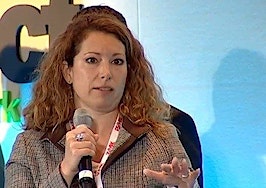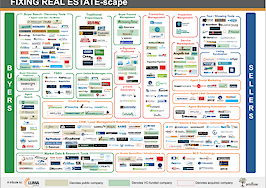Inman is profiling entrepreneurs and executives in the real estate industry. Here’s Doug Perlson, Founder and CEO at RealDirect.
Why’d you decide to join/found your company?
Prior to RealDirect, I had started a technology business, and I was a real estate lawyer by training — so the idea of putting tech and real estate together had been brewing in my mind for some time. When the real estate market was in bad shape and many buyers were underwater, I thought it made sense to launch a brokerage that gave several options to sellers so they could get the benefit of a brokerage but with the cost savings of a FSBO (for sale by owner). So we decided to build RealDirect.

Doug Perlson
Describe a time when you felt particularly insecure about the future of your company. How did you bounce back?
We had a classic, “what if we build it and nobody comes?” fear when we first launched RealDirect since this business model had never been tried before in New York. And since the real estate market was very soft at the time, it took what seemed like a long time to take our listings from “live” to “sold” so that we could prove that sellers would be successful.
That time lag of several months was particularly stressful, but as a venture capitalist once said to me — if you are a start-up and surviving, you are thriving. We eventually came out the other side and have sold hundreds of homes since.
What would you describe as your company’s biggest victory since you joined it?
We have had a series of small victories rather than a big one that has been transformative. Every new client we sign up is a victory, as well as when we close the deal. It allows us to build on our success and demonstrate how we did it to our future clients, which allows us to acquire customers more efficiently.
[Tweet “Doug Perlson: ‘Every new client we sign up is a victory.'”]
What’s been the biggest obstacle your business has encountered, and how have you dealt with it?
Our biggest obstacle has been the perception that RealDirect is anti-broker and trying to put brokers out of business when in fact the opposite is true. We see every day how an experienced broker adds value. We just have a different approach to it.
We have worked very hard to play nice in the sandbox with everyone – even when some others throw sand in our faces.
What puzzles you most about the industry?
Outside of a few metro areas, floor plans are rarely included in a listing, despite their utility. I consider a floor plan the most critical piece of information outside of price, yet most markets will never include it.
What is the most important lesson you’ve learned about building a business?
Building a business is like renovating a home — it takes twice as long as you thought it would and costs two times as much. So make sure you have the cash and time horizon to get to the next level — which is never easy.
What’s the most overrated real estate technology?
I think the 3-D floor plan is overrated. I have seen these floor plans spinning around on several websites, and it does nothing to give a better sense of a property. Now, true virtual tours — like streetview for homes — is another story, and if it can be done cost-effectively, it will change how people view homes online.

Doug Perlson
How will the role of the real estate agent change over the next five years?
Some agents will continue their businesses successfully with little change from how they operate now. But expect to see the brokerage model continue to evolve as technology and consumer transparency continue to change the real estate transaction.
For many agents, there will be opportunities to work in radically different ways in terms lead generation, client-agent relationship, how showings and listings are presented, and compensation.
What motivates you more: power or money?
I am motivated by the opportunity to build a better real estate business. And that means creating an environment that allows both our team and our clients to have more success with our company than anywhere else.
[Tweet “Doug Perlson: ‘I am motivated by the opportunity to build a better real estate business.'”]
What’s your favorite activity outside of work and why?
I enjoy spending time with my family.
What’s your favorite classic piece of literature and why?
While I am not sure it qualifies as a “classic” yet, Jack Finney’s “Time and Again” is one of my favorite works. In addition to it being a great story, it’s also a great real estate book since it takes you back in time to the 1880’s in NYC and you can see how the City evolved over time. Knowing a neighborhood’s history can give you an even greater appreciation of it.
Are you the first entrepreneur in your family?
I come from a family of entrepreneurs. My grandfather came to the U.S. as a tailor and eventually bought the dry cleaning store he worked in. Eventually, he built up a business of nearly 100 stores.
On the other side of my family, my great-grandfather built a dress business on the Lower East Side and eventually bought real estate down there — if only he held onto it!.
What is your biggest professional fear?
Basements.
What is your biggest personal fear?
Basements.
Who do you respect most in the industry?
Without getting specific, I respect people who are willing to take a risk for the greater good. Whether it is building a massive new affordable housing development in the South Bronx, or creating a high end work of livable art in West Chelsea, the public benefits from these projects, and while they are not the easiest projects to tackle, we all benefit from their doing so.
Describe what you do in one sentence: We use a combination of people and tech to help people buy and sell real estate better.
Age: 47
Degree, school (if applicable): J.D., Emory University; B.A., SUNY Albany
Location: New York City
Social media: LinkedIn, Twitter
Are you a real estate leader who’d like to participate in our profile series? Email amber@sandbox.inman.com.




